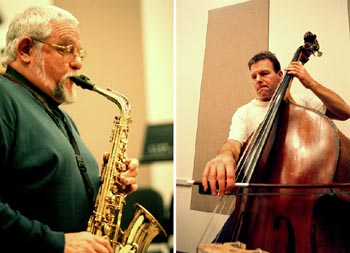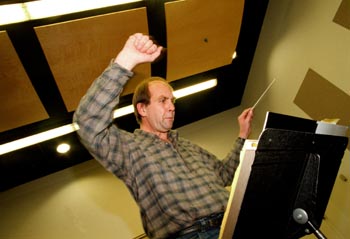![[MetroActive Music]](/gifs/music468.gif)
[ Music Index | Metro Santa Cruz | MetroActive Central | Archives ]
Call of the Wild
Blown Away: New Music Works saxophonist William Trimble (left) and bassist Stan Poplin (right) join the rest of the orchestra for Sunday's performance of 'Night of the Living Composers' at UCSC's Recital Hall.
This year's New Music Works 'Night of the Living Composers' gives classical music an eclectic spin
By Karen Reardanz
FROGS AND MODERN-ROCK RADIO may not be standard fodder for classical music inspiration, but for the minds behind this year's Night of the Living Composers concert, it's perfectly sound. This Sunday night sees the start of Santa Cruz's New Music Works' 1999 season, and its yearly chamber concert dedicated to the works of living modern classical composers once again takes a unique turn.
This year's concert shies away from the more futuristic technical sounds it spotlighted last year, this time favoring works more organic in composition. Along with Lou Harrison's Cinna and Festival Dance--the Aptos composer is a Night of the Living Composers staple--the concert presents Christopher Rouse's ritualistic Haitian-influenced piece, Ugoun Badagris, the world premiere of Palo Alto composer Paul Davies' Gemini Music for the Percussion Ensemble and Frederic Rzewski's set of whimsical one-minute compositions, Spots. Also on the bill are the world premieres of two pieces creative in vision and eclectic in scope, yet steeped in the fundamentals of the classical world: Phil Collins' ode to the frog world, Requiem Ranarum, and Manly Romero's Radiophile, a sonic ride on the New York radio airwaves.
Manly Romero's piece, commissioned by New Music Works for this performance, offers a collage experience of radio days. "The piece is really fresh and funny," explains Phil Collins, composer and conductor of NMW, "mixed with pathos and beauty."
That pathos is Romero's own. "In a sense, [the piece] is autobiographical," Romero explains from his New York City home. "I've been doing a lot of examining of pop stations in an effort to work the contemporary pop aesthetic into my style, to see what I have a feeling for."
What Romero discovered in these examinations is an ability--one he now holds in high affection--to meld pop culture with the classics. Radiophile does just that, grafting classical music--like what he listened to on WQXR, the city's classical station--onto the popular. The two parts of Radiophile's first movement, "Cavatina/Cavabaletta," are adopted from Western operatic tradition, one slow, the other fast, like "the aria the soprano sings to exit the stage in a huff or such," Romero laughs. The second movement, "Elsewhere," is based on a pop song and heavily influenced by modern songsmiths like Sarah McLachlan.
While Romero admits that combining random styles of music is nothing new--"the trend of crossover, employing different melodies and rhythms, goes back centuries"--it is new to him.
"This style is unique for me," he says. "I became interested in this when I was in grad school, where I came in contact with composers writing this kind of music for the first time," he says. "It was something I wanted to explore.
"It took me a long time to come to an understanding of it. I didn't listen to pop radio for years; I was only interested in the classical world. But after leaving grad school, I was trying to come to terms with different aesthetics."
Romero credits composer Michael Daugherty--whom Romero deems "the living embodiment of the whole movement"--with helping him appreciate drawing pop culture and humor into his classical realm. Daugherty is best known for his Metropolis Symphony, an homage to characters from the Superman comics that was performed at last year's Cabrillo Music Festival, and for employing kitsch in his works by naming pieces after such icons as Desi Arnaz and Jackie O.
Somewhere between Daugherty's pop lingo and the loftiness of high culture, Romero has carved out his own compositional niche.
"Others have explored a more serious means of employing pop idioms within the larger classical idiom, like the opera," he says. "And I tend to fall into this camp."
Romero's foray into the cosmos of New Music Works with Radiophile marks not only his growth as a composer, but his entrance into the world of professional musicianship.
"This is one of my first performances since leaving grad school," Romero says. "The way that the piece has gone has felt like a sort of resealing or resigning between myself and the profession as a whole."
Frog-get About It: On Sunday, Phil Collins presents an ode to the frog world.
ON THE AMPHIBIOUS side of Night of the Living Composers is Phil Collins' ecologically sound requiem to extinct frog species, Requiem Ranarum. Inspired by Smithsonian Folkways' "Sounds of the North American Frogs," and the frogs' range of timbre, rhythm and personality, Collins began researching frog species. What he found were five extinct species (and three suspected of being extinct) that he eulogizes in Requiem.
"I was enchanted by [the frogs'] sounds," he says, "and I was trying to think about how to utilize them in composition. ... I set them in a generic Christian memorial service. It's very ecumenical. It's like sitting in on a joint congregation.
"One frog is the pastor and delivers a 'service,'" Collins continues; "his voice keeps popping up throughout the piece. Then there's the hymn--this one is sung by a bunch of different frogs, an overlay of frog calls. The only voices in the piece are the soprano--who doesn't sing anything but the five frog names in Latin--the frogs and the crusty Southern narrator."
The end result is a piece that's tranquil and dramatic, worldly and familiar. The characters themselves lend a certain amount of levity (who has ever considered frogs to be serious critters?), but there is an undercurrent of serious emotion that Collins hopes will be felt by listeners.
"What I'm after is to show how there's this other life form, one that people have a great fondness for," Collins says. "There are species dying off in ecologically pristine areas, where there's no ecological intrusion or people. They're signaling a great ecological problem."
[ Santa Cruz | MetroActive Central | Archives ]
Copyright © Metro Publishing Inc. Maintained by Boulevards New Media.
![]()

George Sakkestad
George Sakkestad
Night of the Living Composers will be performed on Sunday (7pm) at the Recital Hall, UCSC. Tickets cost $12/$10/$5. A composer panel precedes the concert at 6pm, while a reception follows at Ristorante Avanti that will be catered by Joseph Schultz. For more info, call 427-2225.
From the February 3-10, 1999 issue of Metro Santa Cruz.